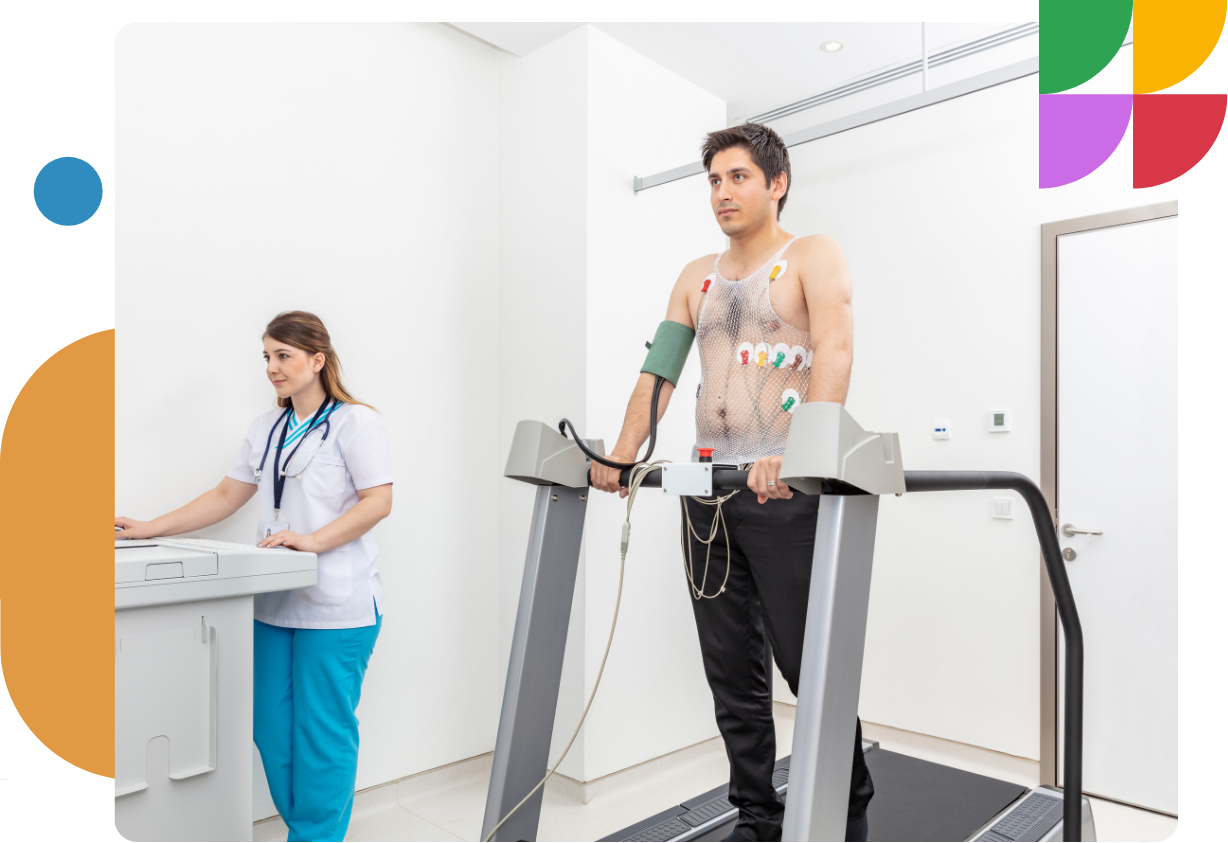facilities
TMT
This test is essential in diagnosing conditions like coronary artery disease, exercise-induced arrhythmias, and cardiac ischemia.

At ARAVIND HEART CARE, we offer the Treadmill Stress Test (TMT) to assess how well your heart performs under physical exertion.
What Is a TMT (Treadmill Stress Test)?
The TMT involves walking on a treadmill while connected to an ECG machine that continuously monitors your heart’s electrical activity. As the test progresses, the treadmill’s speed and incline are gradually increased to make your heart work harder. The goal is to observe how your heart responds to increased levels of physical stress. This test helps identify areas where your heart may be struggling to get enough blood supply during activity, which could signal blockages in the coronary arteries or other heart issues.
How Is the TMT Performed?
Before starting the TMT, electrodes are placed on your chest, arms, and legs to monitor your heart’s electrical activity through an electrocardiogram (ECG). As you walk on the treadmill, the speed and incline are adjusted in stages, increasing the effort required. Throughout the test, your heart rate, blood pressure, and ECG readings are continuously monitored. The doctor will closely observe how your heart responds to the increasing workload and will stop the test if any concerning symptoms arise.
Who Should Take a TMT Test?
A TMT is recommended for:
- Individuals experiencing symptoms such as chest pain, shortness of breath, or irregular heartbeats during physical activity.
- People with a family history of heart disease or those who are at a higher risk of developing heart conditions.
- Patients who have undergone angioplasty, bypass surgery, or stent placement, to evaluate the effectiveness of these procedures.
- Individuals who need to monitor the progression of heart conditions, such as angina or coronary artery disease.
Benefits of the TMT Test
- Early Detection of Heart Disease: The TMT helps detect coronary artery disease and other conditions that may cause reduced blood flow to the heart.
- Evaluates Exercise Tolerance: The test helps determine how much physical activity your heart can handle, which is useful for individuals recovering from a heart condition or those starting a rehabilitation program.
- Monitors Effectiveness of Treatment: For patients undergoing treatment for heart conditions, the TMT provides valuable information about how well the treatment is working.
- Non-Invasive: The TMT is a non-invasive and safe test, making it an effective way to assess your heart’s performance during physical stress.
Preparation for the TMT Test
To ensure accurate results, follow these preparation tips before your TMT test:
- Wear comfortable clothing and shoes suitable for walking or light exercise.
- Avoid heavy meals at least 2-3 hours before the test.
- Inform your doctor if you are taking any medications, as some medications may need to be paused before the test, particularly those affecting heart rate or blood pressure (such as beta-blockers).
- Stay hydrated, but avoid caffeinated drinks, as they can affect your heart rate.
- If you experience any symptoms like dizziness, chest pain, or shortness of breath, inform the doctor immediately during the test.
After the TMT Test
Once the test is complete, Dr. C.S. Aravind will evaluate the results to determine if your heart is getting enough blood and oxygen during exercise. If there are any signs of reduced blood flow or abnormalities, additional tests may be recommended, such as an angiogram or echocardiogram, to further investigate the issue.
FAQs
Yes, the TMT is safe and is performed under medical supervision. Your heart activity is closely monitored throughout the test, and it will be stopped if there are any signs of distress or abnormal heart function.
The entire test, including preparation and post-test monitoring, usually takes about 30 to 45 minutes. The actual time spent on the treadmill varies, but typically lasts around 10 to 15 minutes.
An abnormal result could indicate a blockage in the coronary arteries or another issue with the heart's ability to handle stress. Further diagnostic tests, such as an angiogram, may be recommended to confirm the diagnosis.
Most patients can resume normal activities, including driving, after the test unless the doctor advises otherwise based on your condition or test results.
The test itself is not painful, but you may feel fatigued, and some patients may experience mild chest discomfort or shortness of breath during the test due to the increasing intensity of the treadmill.
Yes, the test will be stopped immediately if you feel any discomfort, such as chest pain, dizziness, or severe shortness of breath.